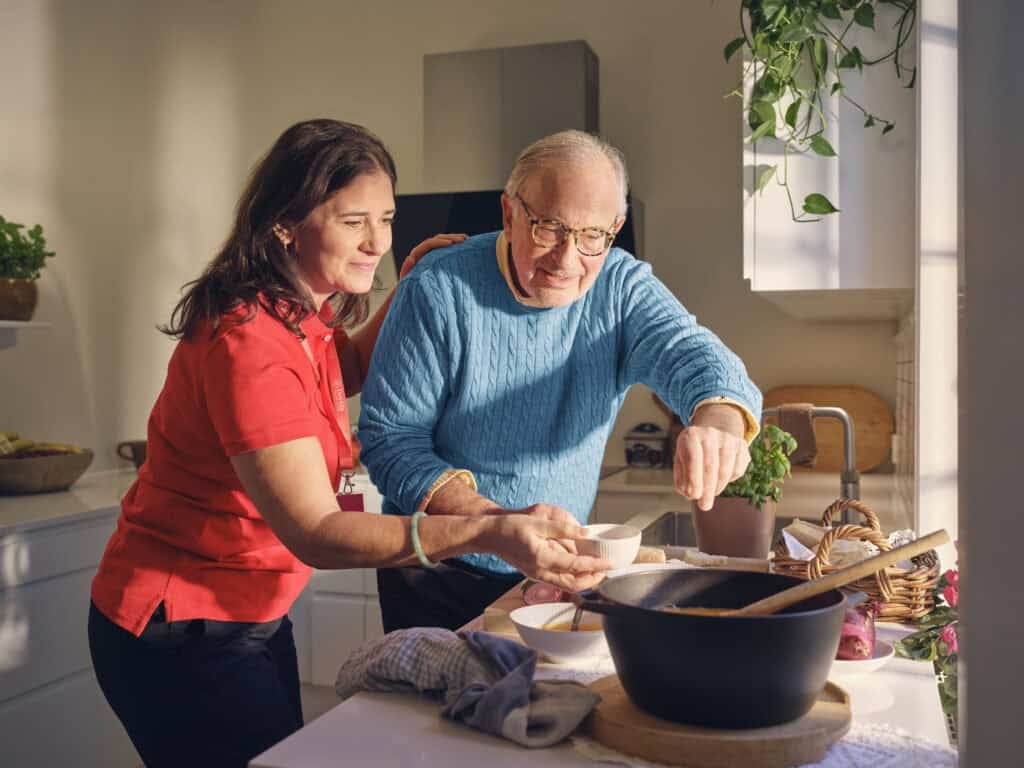Blog
16 September 2025
Navigating the Three Support at Home Pathways
Support at Home recognises that care needs aren’t always predictable or constant.
Beyond regular ongoing services, the program offers three specialised pathways designed to provide targeted support during specific life circumstances. Understanding these pathways helps you know what additional support is available when you need it most.
The Restorative Care Pathway: Reclaiming Your Independence
The Restorative Care Pathway promotes recovery and independence. This 16-week program provides up to $6,000 for intensive allied health and nursing services designed to help you maintain function or adapt to new health conditions.
Perhaps you’ve experienced a fall and lost confidence in mobility, or you’re managing a new chronic condition that’s affecting your daily activities. The Restorative Care Pathway connects you with physiotherapists, occupational therapists, and other specialists who focus on rebuilding your function and independence.
The program aligns perfectly with Dovida’s approach to care – we empower you to live your life, your way. Restorative care provides intensive, goal-focused support that can improve your quality of life and maintain your independence at home.
You can access this pathway even if you’re already receiving ongoing Support at Home services. The restorative care budget is separate from your regular quarterly allocation, helping you to access increased services to support your wellbeing and reablement, alongside your existing funding.
The End-of-Life Pathway: Providing comfort and support
When facing a terminal diagnosis with less than three months to live, the End-of-Life Pathway ensures you can spend your final time at home with comprehensive support and dignity. This pathway provides $25,000 over 12 weeks specifically for palliative care services.
The pathway recognises that end-of-life care often requires intensive support that goes beyond regular aged care services. It covers increased personal care, nursing support, symptom management, and family support services. The funding allows for increased care when needed, ensuring comfort and peace of mind for both you and your loved ones.
At Dovida, our caregivers receive specialised palliative care training to provide compassionate, person-centred support during this important time. We work alongside your medical team and any specialist palliative care services to ensure holistic, coordinated care that respects your wishes and maintains your comfort.
The End-of-Life Pathway can be accessed by people already receiving Support at Home services and replaces any ongoing funding that is received or it can be accessed by those not currently in the system. This flexibility ensures that location, timing, or current service status don’t become barriers to receiving appropriate end-of-life support.
The Assistive Technology and Home Modifications Scheme: Enabling your Independence
The Assistive Technology and Home Modifications scheme (AT-HM) addresses one of the biggest frustrations of Home Care Packages – having to save for months or years to afford essential mobility equipment or home modifications. This scheme provides separate funding specifically for assistive technology and also for home modifications, ranging from mobility aids to significant home adaptations such as bathroom improvements.
The scheme operates on three funding tiers, with separate funding available for assistive technology and home modifications: low (under $500), medium (up to $2,000), and high (up to $15,000). Your assessment determines which tier you’re eligible for, based on your specific needs and circumstances. The funding covers not just the equipment or modifications, but also professional assessment, prescription, installation, and training to ensure you can use everything safely and effectively.
Assistive technology might include mobility equipment like walking frames or wheelchairs and bathroom safety equipment like shower chairs. Home modifications includes grab rails, non-slip mats, or more significant modifications like ramps or bathroom redesigns. The scheme uses evidence-based guidelines to ensure you receive appropriate equipment that genuinely enhances your safety and independence.
Accessing the Pathways
Each pathway has specific eligibility criteria and assessment processes. For the Restorative Care Pathway, your provider can help you request an assessment if they believe intensive allied health support could improve your independence. The assessment focuses on your potential for improvement rather than just your current functional ability.
End-of-Life Pathway access requires medical certification of life expectancy and functional status. While these conversations can be difficult, having this pathway available means you can make informed decisions about where and how you want to spend your final months.
The AT-HM scheme assessment can be conducted alongside your regular aged care assessment or separately when needs arise. Your care partner plays a crucial role in identifying when equipment or modifications might benefit you and initiating the assessment process.
Integration with Ongoing Care
These pathways complement rather than replace your ongoing Support at Home services. You might use the Restorative Care Pathway to provide additional services that help you to regain strength after a health event before returning to your regular service mix with improved independence. The AT-HM scheme enables you to access essential equipment that helps you maintain your independence and means your ongoing budget can be used for services rather than purchasing equipment.
This integrated approach ensures that all aspects of your care work together toward the common goal of supporting your independence and quality of life at home. The pathways provide intensive, targeted support when you need it, while your ongoing services provide the foundation of daily support that keeps you safe and comfortable.
Understanding these pathways empowers you to advocate for the support you need during challenging times, knowing that additional resources are available when your circumstances change.
